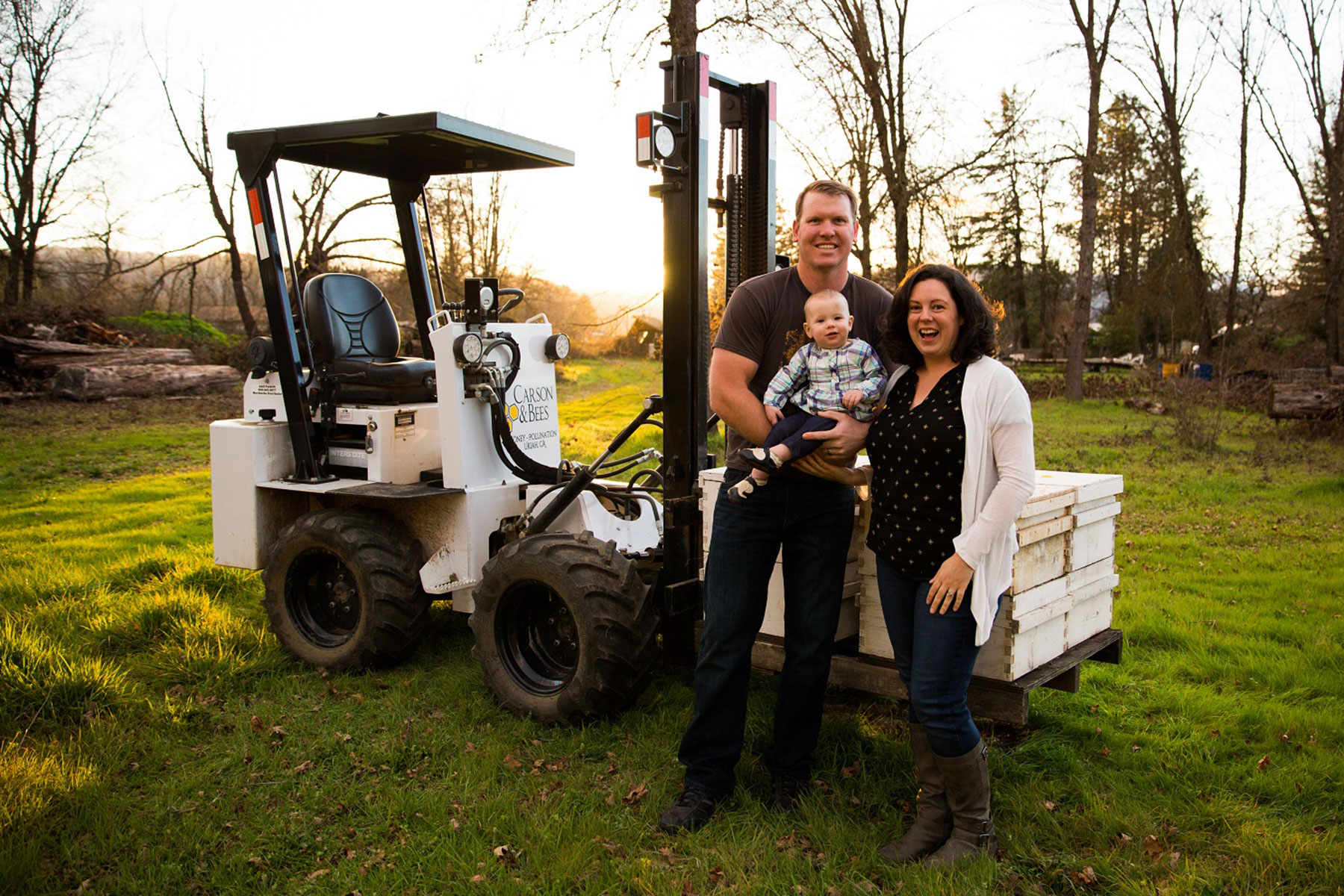Carson & Bees

The Business of Bees—Here and Elsewhere
Carson Elmer is as local as it gets. He was born and raised in Potter Valley, did 4H with his mom and woodworking with his dad, and started beekeeping at the age of 12 under the guidance of family friend Jack Booth of Cinnamon Bear Farm. He has run some version of his business, Carson & Bees, ever since, most recently with his wife Elizabeth, out of their home in Ukiah. The business has never earned enough to be his full-time occupation, though, so he worked for 11 seasons as a CalFire wildland firefighter before the birth of his daughter, Marian Alice (“Mae” for short), in 2017. After that, he became a carpenter with Hawkes Construction to stay closer to home.
The dream to work for himself as a beekeeper has always been at the back of his mind. To take a step in that direction, in February Carson, Elizabeth, Mae, and their dog Bee made the move east to Davis. It’s the first time he’s ever lived outside of Mendocino County, and it was a tough decision to make. Carson and Elizabeth are both deeply rooted in the community. “Having to tell so many people that we were leaving was incredibly hard,” says Elizabeth. “Every time I left the house, I would run into someone I had to break the news to. Lots of people thought I was joking at first— that’s how unexpected this move was for us.”
Carson is now a full-time beekeeper for Davis-based Tauzer Apiaries. “Our friends own and operate the business,” says Carson. “I feel really lucky to have an opportunity to work with people I respect and like. When we decided to take Carson & Bees to the next level, they were our first stop.” Carson plans to work for Tauzer for two years to learn the ins and outs of commercial-scale beekeeping, and then he plans to return home to give it a go on his own. “There isn’t anyone in Mendocino County that can give me this kind of experience,” explains Carson. “The biggest operations that are nearby are in the Central Valley, close to the almonds.”
Late winter and spring are the most intense time of year for beekeeping. During almond pollination, it’s estimated that upwards of 90% of all U.S. hives are in the Central Valley—literally hundreds of thousands of honeybee hives. Beekeepers negotiate contracts with almond growers, move their hives in before the trees bloom and back out again six weeks later. Then the springtime work starts. Healthy hives are split to form two or three new hives, queens are bred to replace older generations, and bees are moved around to pollinate a variety of crops including apples, pears, and sunflowers. Spring and early summer are also peak honey production time. The more rain a region gets, the more honey it produces. “By starting work in February, I got to start at the beginning of the beekeeping year,” says Carson. “That will let me watch and learn from the full cycle, rather than starting in the middle.”
For the next two years—or until the Elmers return to Ukiah—Carson & Bees will be on hiatus. They have enjoyed working with Mendocino County locations that support the local food movement. Carson & Bees honey can be found at the Ukiah Natural Foods Co-op, Westside Renaissance Market, Hopper’s Corner Store, Redwood Valley Market, Surf Market, several winery tasting rooms, and through the MendoLake Food Hub. “We stocked everyone up before we left,” says Elizabeth. Buy now, because once the stock is depleted there will be no more until the family returns. The good news about honey is it never goes bad, so their 2018 surplus can be stored until they return. Says Elizabeth, “We still have lots of jars and labels, so when we come back it’s just a matter of putting our stored honey in the bottling tank, and we’ll be back in business.”
Carson’s hives have been absorbed into Tauzer Apiaries. When he is no longer an employee there, he will get the same number of hives back. “It also takes away the burden of caring for my own hives while I work for them,” says Carson.
Anyone who has been paying attention to the news knows that bees are in trouble, and beekeeping is a tough industry these days. “It used to be that you checked on your hives once a year, and most of them survived the winter,” says Carson. “Now beekeepers have to intervene with mite treatment and supplemental feeding several times a year, and it’s normal to lose half or more of your hives every winter.” The next two years will give Carson the opportunity to see if his dream of being a full-time, independent beekeeper is viable or not. But one way or another, Carson & Bees will return to Mendocino County.
“We’re not selling our house or any of my equipment,” says Carson. Adds Elizabeth, “We love it here—this is our community. We’ll be back.”
Photos by Dustin Cantrell

